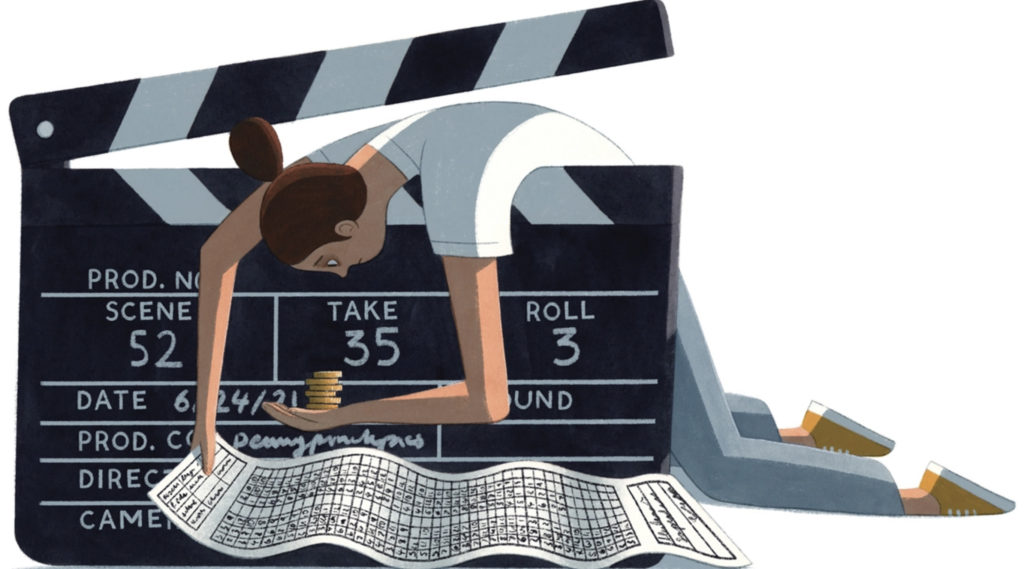Behind the camera : Tiffany Tell All
Uncategorized
Film and TV are at the center of global culture. Every Sunday night you can find discussions on Twitter about the latest episode of some new HBO series. You might hear people sitting outside of a cafe talking about the last film they saw, maybe about how terrible the new Avatar movie was. But what goes on behind the camera? What are the lives like of the people who create the films and series we seem to be so obsessed with?

For this interview, I spoke with Tiffani. Up until two years ago, Tiffani worked in Hollywood as a film and television producer and assistant director. Now, she’s a film student at a small university in Paris. Tiffani gave me a look behind the curtain, so to speak, into the inner-workings of the Hollywood film and television industry.
Q : So, Tiffani, can you explain to me a little about what your job was?
A : Yeah, so I was a producer and assistant director. Basically I was the person who got shit done (laughs). Yeah, I had to be juggling a lot at one time you know? I was basically managing everything behind the camera, when people took breaks, who was doing what, when something needed to get done, scheduling in general. It’s a hard job but I love it. I don’t necessarily miss working in Hollywood specifically, but I do miss the job itself.
Q : Sounds like you were fairly busy.
A : (laughs) You could say that. Working a 20-hour day under high pressure and stress can really get to you.

Q : Can you talk to me a little about that actually? The struggles and challenges of working in Hollywood?
A : Of course, get ready for a lot. Basically, it’s a pretty thankless job. It’s just go go go and there’s nobody there to let you know that you’re doing well, that you’re putting in good work. There’s always this feeling that you could be doing whatever you’re doing more efficiently. And the days are so long (laughs), I mean I’m laughing but I’m honestly a little traumatized. I was working, pretty regularly I might add, 18 to 20 hour days. That means we were doing night shoots as well. Night shoots are brutal ‘cus it’s cold, it’s dark, you’re struggling to see what you’re doing, they’ve got high beams going, and by the way, you don’t get to take breaks.
Q : How is that, isn’t that some kind of workers’ rights violation?
A : You would think (laughs), but they get away with a lot in Hollywood. You get no breaks, sometimes you don’t even get to eat. Craft services is a joke, like why are they even there if we can’t take breaks?
Q : Did you ever notice other things that seemed like violations?
A : I mean yeah, especially before Me Too. Me Too kinda changed the game, for the better. Before Me Too, men could really get away with anything. I mean, they still get away with a lot. They would tell me to go get them coffee, you know really insulting stuff. Like, I was working as a producer and assistant director, it’s not my job to get you coffee just because I’m a woman!
Q : Can you talk a little more about pre-Me Too, if you’re comfortable?
A : Yeah definitely, although it’s a little hard to talk about. Male coworkers would just make really inappropriate comments, they’d even touch you up a bit. It was mostly the comments though, and that got really demoralizing. I mean, every day you show up to work and somebody’s there to make you feel uncomfortable, to talk about your body. That definitely got better after Me Too, but men still make comments. They just got a little more careful about what they said, still kind of inappropriate.
Q : How does that behavior affect the working environment?
A : Well, it meant all the women were always uncomfortable. I mean, you show up to work and you know it’s gonna be uncomfortable. You know that people are gonna make you uncomfortable. It really gets you, you know? It gets you down. And I think it affects your ability to put in the work. It affects your ability to focus. And then of course they’d make comments about the women being ditzy. About how we weren’t able to focus. It was really brutal. And it was a scary time to be a woman in Hollywood. I think it was always scary, until Me Too. Then it got a little better.

Q : Do you,
A : Sorry to interrupt but I just wanna add that it’s still not great. The men still make comments, it’s just not as blatant. And they’re less likely to touch you up (laughs).
Q : Oh no worries, I was just gonna ask you, do you ever miss it?
A : I think I miss the energy. To some degree, I miss how busy I was. But at the same time, I don’t think I ever wanna work in Hollywood, like ever again. I wanna stay and work in French cinema maybe, or English. Hollywood is toxic.
Q : Well on that note, those are all my questions. Do you have anything you want to add?
A : Just remember that, Hollywood is toxic.
Q : Well, thank you for doing this interview with me!
A : Any time (laughs).
